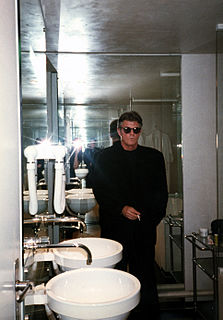A Quote by Lewis Baltz
The photobook occupies that deep area between the novel and the film.
Related Quotes
I'm always trying to make something that is impossible to film. Why would somebody just read a novel when they can see it on TV or in the cinema? I really have to think of the things fiction can do that film can't and play to the strengths of the novel. With a novel, you can get right inside somebody's head.
Many people nowadays live in a series of interiors...disconnected from each other. On foot everything stays connected, for while walking one occupies the spaces between those interiors in the same way one occupies those interiors. One lives in the whole world rather than in interiors built up against it.
If I can give a young author any advice, whatsoever, never let anyone announce the film sale of your first novel. Film rights are sold to almost every novel, but it shouldn't be the lead story in your first engagement with the press. Then you end up getting reviews like "a novel made for the screen" and things like that.
In the case of my second film The Fish Child (El Niño Pez), I had written the novel about 5 years before I made into a film. In the case of The German Doctor I had published the novel a year before I started writing the script, I even had another project to shoot. But I had this idea of the powerful cinematic language from the novel that I couldn't let go of.
Photons come out of nowhere, they cannot be stored, they can barely be pinned down in time, and they have no home in space whatsoever. That is, light occupies no volume and has no mass. The similarity between a thought and a photon is very deep. Both are born in a region beyond space and time where nature controls all processes in that void which is full of creative intelligence.
I read a blog about this young filmmaker in the Philippines who made a short film, and one of the characters in the film reads my novel and then starts discussing the novel with someone. The idea that my book can inspire another artist and be part of that other artist's work... that's the reason I write.
I don't make movies. I don't feel that I have to have artistic control. Part of this comes from the fact that the book lives on no matter what Hollywood does to your novel in terms of a film. Now, you try to be careful who you allow to do your film because nobody wants their novel to become a turkey movie. But, on the other hand, it is a crapshot anyway, because even the best people can make a bad film.





































